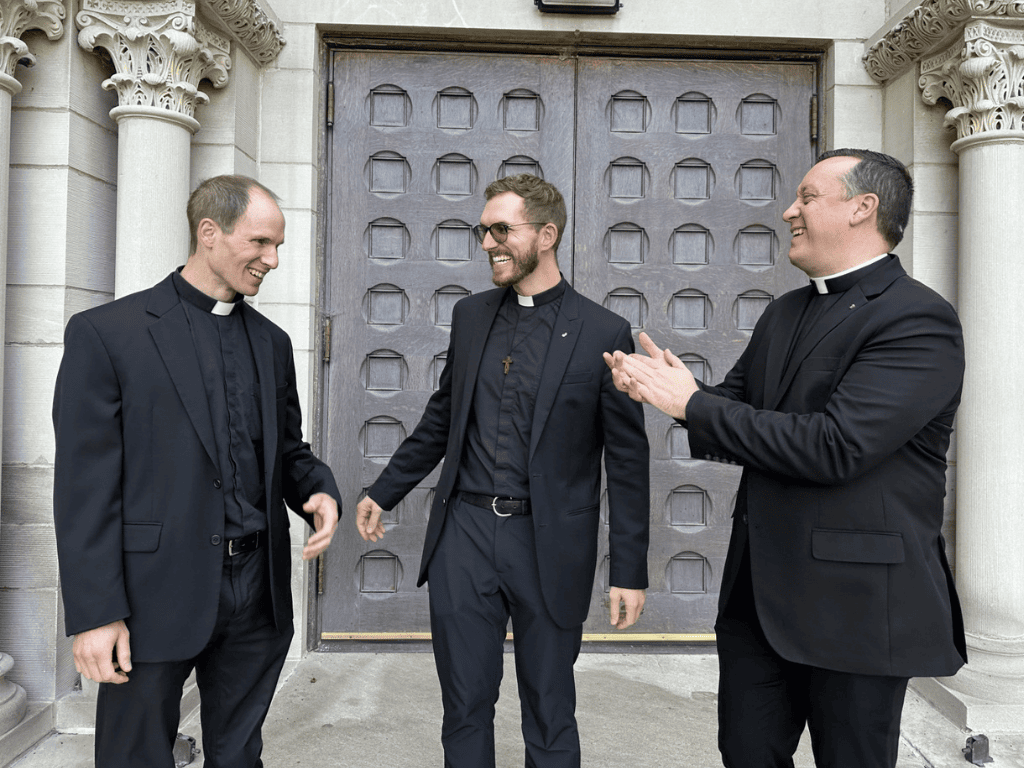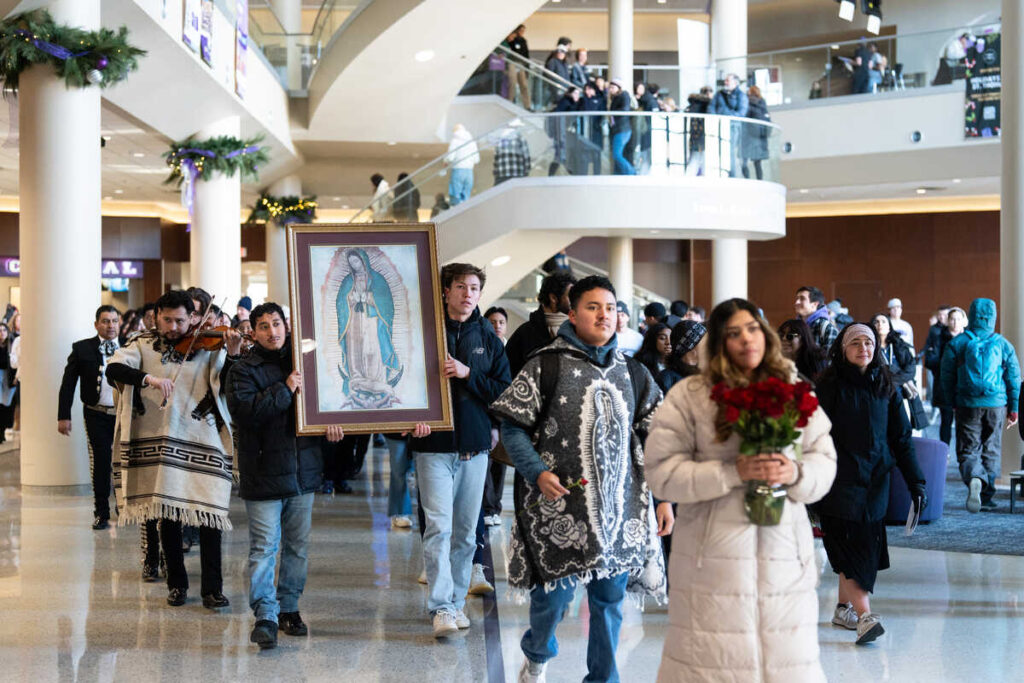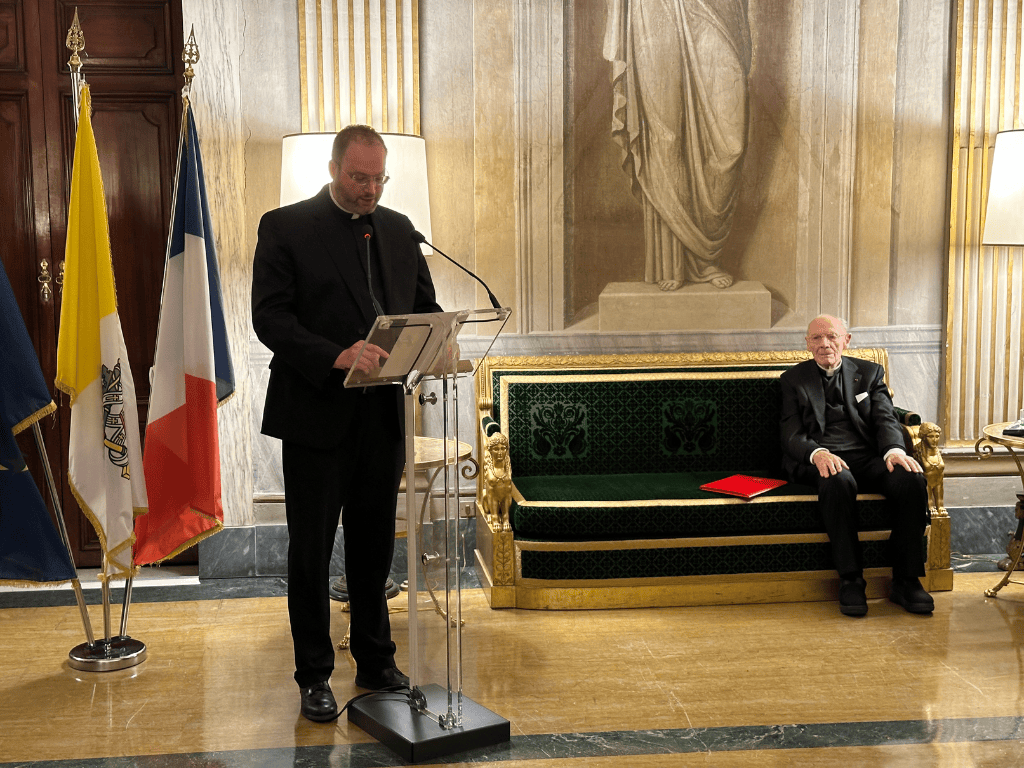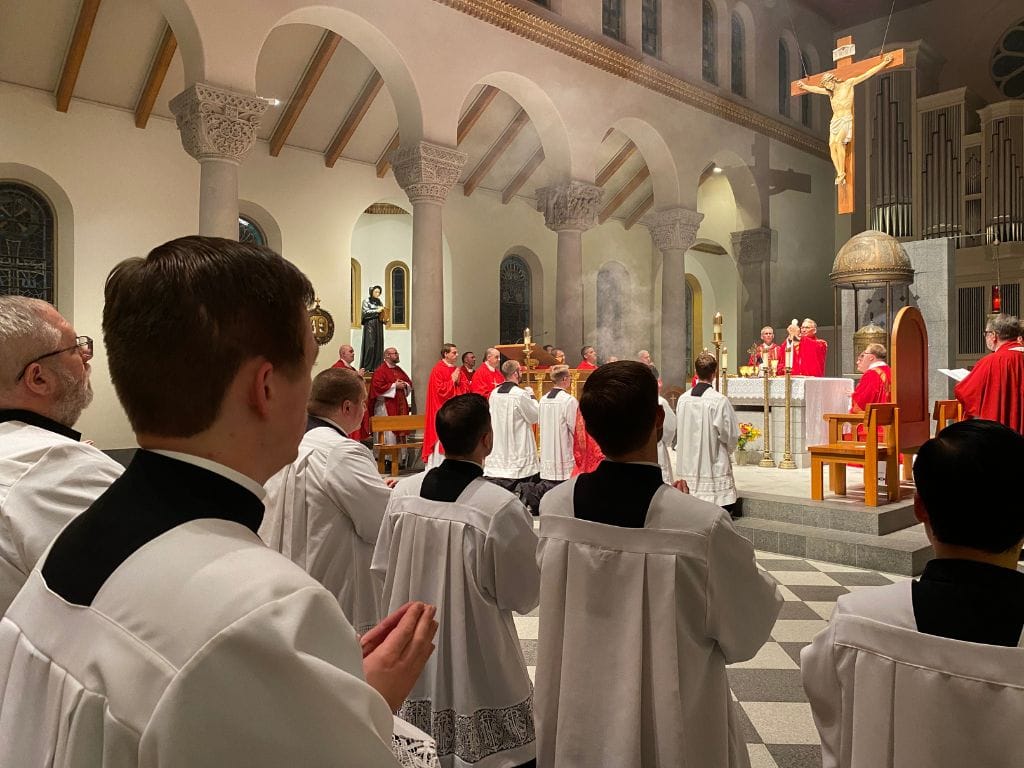On an early September day that feels like summer in Minnesota despite school being back in session, Father Nels Gjendahl greets every undergraduate student he meets during a walk across the University of St. Thomas campus.
Many of them return his “hello” and smile with a grin or nod of their own. Others have AirPods in and are immersed in music or a podcast.
Gjengdahl is used to these types of interactions with young people, having served previously as chaplain at Holy Family Catholic High School in Victoria, Minnesota, and Saint Thomas Academy in Mendota Heights before that. He can tell you which Subreddits to avoid and the nuances between posting on TikTok and Instagram – though he doesn’t partake himself.
“I’ve never Snapped a Chat, and I’ve never Tikked a Tok,” joked Gjengdahl, who began as The Saint Paul Seminary formation director and dean of men earlier this year.
What Gjengdahl has done, along with two other priests who joined the seminary faculty this year, is learn to relate and listen. It’s a necessary trait for him, spiritual director Father Kevin Manthey and spiritual director/adjunct instructor Father Joseph Kuharski in helping form tomorrow’s Catholic priests.
Gjengdahl and Manthey were ordained out of The Saint Paul Seminary. All three new priests on staff are former high school chaplains.
“To be honest, I enjoyed my time in seminary … but seeing it on the other side is really enlightening,” said Manthey, who along with Kuharski was ordained in 2014 (Kuharski attended major seminary at the Pontifical North American College in Rome). “The care that each person (who works here) puts into their job and into helping seminarians grow as men, as sons, as brothers, as future fathers – it’s just been really moving to me.”
Starting by listening
Gjengdahl is ready for the loaded question.
How can the Catholic Church nurture young people – including potential future priests – in a culture that’s increasingly hostile toward what the Church teaches?
“This is nothing new for the Church, but each time we need to be reminded … you do have to listen,” Gjengdahl said. “You have to create time to really listen to the kids and what they’re experiencing, because each kid can have a very different experience of the world.”
Listening breeds trust. And trust leads to open, deep conversations. That’s where the Gospel can then be shared effectively.
— FATHER Kevin Manthey, Saint Paul Seminary spiritual directorThat’s one key aspect where people can feel at home, supported and cared for through the highs and lows and also pushed to grow deeper in holiness.”
It’s a two-step endeavor that bodes well for Gjengdahl, who’s in charge of the practicalities of daily seminary life, from reminding the seminarians to set their alarms for morning holy hour to helping them arrange travel for holiday breaks.
It’s just as important for spiritual directors like Manthey and Kuharski. The Saint Paul Seminary, following requirements handed down by the Vatican and United States Conference of Catholic Bishops, has put an increased emphasis on human and spiritual formation in recent years.
Seminary spiritual directors play a crucial role in accompanying seminarians while they grow in holiness and discern God’s will for their lives.
“Sometimes, as priests or Church leaders, we can fall into trying to judge our efforts, or even our value, based on the impact, the results we are making,” Kuharski said. “We can tend to ‘count the sheep’ rather than being amazed by what the Lord is doing in the one individual soul right in front of us, even through our meager, imperfect efforts. ‘God’s thoughts are not our thoughts,’” as Isaiah chapter 55 says.
Interest in the other
The St. Lawrence River’s opening into the North Atlantic Ocean makes for some interesting weather patterns in Quebec City.
Among them are large masses of ice constantly pushed around by the wind during the winter months; the river doesn’t fully freeze due to the current. Each February during the Quebec Winter Carnival, crews of five alternately push and paddle a specially designed canoe across the ice and through the water in a race to the finish.
As a priest of the charismatic movement Emmanuel Community, Manthey was assigned to a parish in Quebec City before coming to The Saint Paul Seminary. He took to “ice canoeing” in Canada right away.
He also learned a lot of French.
“I tend to do things that people around me like to do,” Manthey said.
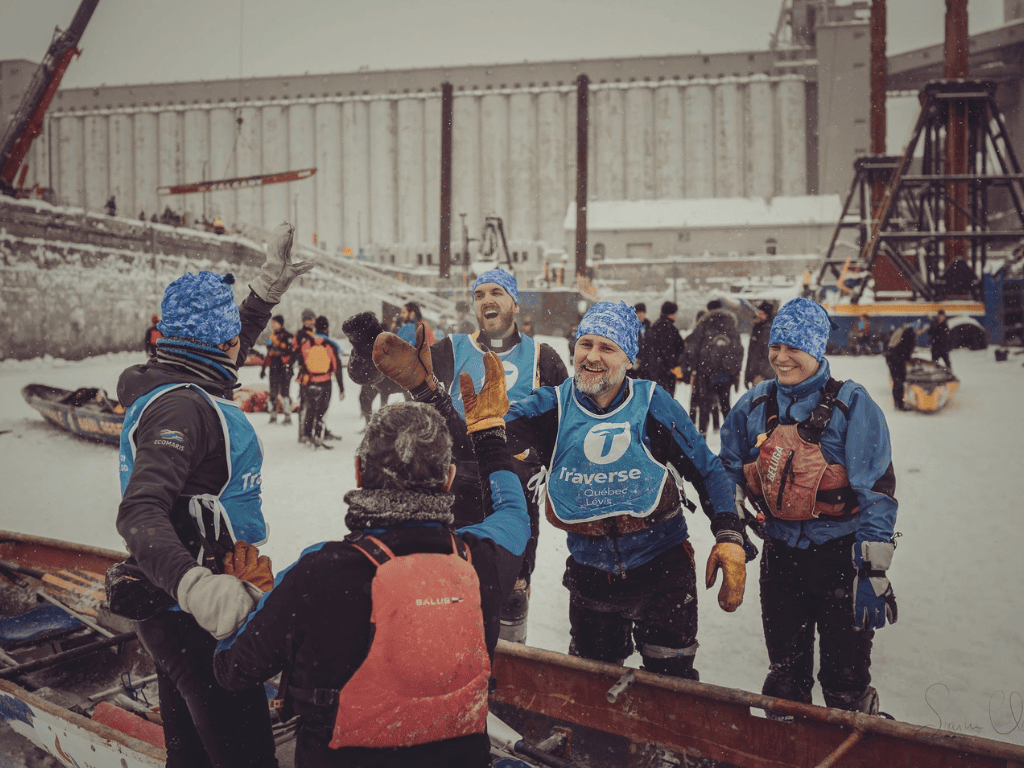
During COVID-19, he played the drums for a podcast with other priests in Canada to provide praise and worship music to local Catholics in lockdown.
Previously, when he was chaplain at Hill Murray High School in Maplewood, Minnesota, he’d attend trap shooting and ski team practices, hang out during math club sessions and show up frequently at other events around campus, just to “show (students) that you care about what they care about … as a natural connection point,” Manthey said.
It’s a lot easier to relate to a priest when they relate to you, Gjengdahl said.
“There needs to be that recognition of the other,” Gjengdahl said. “It’s starting with listening, but also recognizing how special it is when somebody is open and vulnerable. And to treat that as what it is – very sacred and very, very beautiful. And then speaking the life of the Gospel into that is really an exciting thing.”
The importance of fraternity
Kuharski is one of over 30 members of the Companions of Christ, a group of Archdiocese of St. Paul and Minneapolis priests living together in fraternity.
Community is an essential part of seminary formation – and, increasingly, the life of the lay faithful, too – and Kuharski is well versed after spending the past half decade as a spiritual director and formator at Saint John Vianney College Seminary; both SJV and The Saint Paul Seminary are located on the campus of the University of St. Thomas.
“I often thank God for my time at SJV,” said Kuharski, who also previously served as chaplain of DeLaSalle High School in Minneapolis. “At the risk of sounding selfish, I see those five years as instrumental in how the Lord has brought healing and growth in my own spiritual life.
“The young men were certainly an ongoing inspiration to me to strive after holiness.”
Manthey serves the lay members of the Emmanuel Community. As part of this charism, he is often assigned on mission for the community – it’s why Manthey was in Canada, and before that New York, and before that Belgium.
A large part of seminarian formation is leaning on your brothers, any seminarian will tell you. And the laity – particularly in the Archdiocese of St. Paul and Minneapolis – is starting to see fruit from some of the strategies deployed by movements like Emmanuel Community, particularly the formation and activation of parish small groups.
“That’s one key aspect where people can feel at home, supported and cared for through the highs and lows and also pushed to grow deeper in holiness,” Manthey said.
That’s the environment Manthey, Kuharski and Gjengdahl are now tasked with perpetuating at The Saint Paul Seminary.
Editor's Note: A version of this story originally ran on The Saint Paul Seminary website, which is located at the University of St. Thomas.
